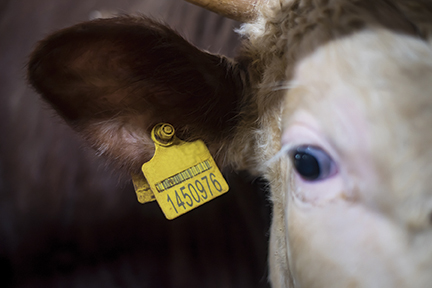ABBOTSFORD – Applications are now being accepted for the next round of funding for the BC traceability adoption and livestock tag reader rebate programs.
Part of the federal-provincial Canadian Agricultural Program (CAP), the programs provide funding for software, hardware and training for farmers and agribusinesses to adopt traceability programs.
“Traceability is the ability to track a product one step forward or one step back,” program manager Jen McIntyre of PWC told Fraser Valley members of the Canadian Association of Farm Advisors, February 20.
The traceability adoption program is available to individual producers, transporters, packagers, harvesters, warehouses, importers, processors, and distributors and exporters of seafood and agri-food products. A third program, the traceability value chain program, will be introduced later this year to fund applications from sector organizations and multi-farm or multi-business groups.
To be eligible, applicants must be a legal entity (i.e., have a business number) operating in BC and, in the case of livestock producers, have a valid BC premises ID. Applicants are limited to a maximum of $16,000 per year.
Applicants can apply in multiple years but second, third, fourth or fifth year applications will only be approved if there is sufficient money available.
“Our priority is for first-year applicants,” McIntyre says.
Since it began in 2018, the program has handed out about $1.75 million.
“We approved 60-70 applications last year,” McIntyre said, adding “we rarely decline a project.” The 2019 program was initially oversubscribed, but an additional allocation of $313,500 in November allowed it to fully fund all of last year’s successful applicants.
McIntyre would not disclose how much funding is available for 2020, saying only that until April 30, one quarter of the funding is reserved for the livestock tag reader program and another one quarter for applications from the seafood sector.
Eligible costs include RFID scanners, label printers, dedicated computers and traceability software. Added this year are on-site databases and web servers. Multi-use mobile devices, e.g., tablets, have also been added this year but will only receive 50% funding. Consultant fees and training are eligible but must not exceed one quarter of the total project cost. Ongoing support and maintenance are not covered.
That may be inadequate, says Minty Gadhock, one of the consultants who review project applications.
“The reason many traceability projects fail is because of inadequate support.”
McIntyre stressed the program only covers costs incurred after a project has been approved. Gadhock called that another shortfall as initial consultations to determine what might be required are therefore not covered.
McIntyre says software development is not included in the traceability adoption program but will be in the traceability value chain program when it is rolled out later this year.
Program guides, a self-assessment guide and detailed application forms are available online at [bctraceability.ca].
McIntyre promises a quick response to any applications.
“We try to send out an approval letter within 10 days.”


 Pruning priorities different for FV grapegrowers
Pruning priorities different for FV grapegrowers